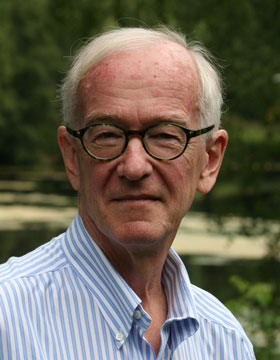
Richard Swedberg, Ph.D.
Professor of Sociology
Cornell University
Born in 1948 in Stockholm
Studied Law at Stockholm University and Sociology at Boston College
Arbeitsvorhaben
Theorizing in Social Theory: What It Is and How to Do It
My book The Art of Social Theory (Princeton 2014) is the first part of a larger project that I will continue to develop during my year at the Wissenschaftskolleg. In this work, I attempted to further develop social theory by focusing primarily on theorizing or the process that precedes the final formulation of a theory. In doing so, I am especially interested in understanding what happens in the so-called context of discovery, and how this can be used to improve today's social theory. My primary reasons for working on this topic are two, namely (1) to advance social theory by learning more about the practices that are needed to produce a theory (and how to handle theory in empirical research) and (2) to devise new ways of teaching theory to students (beyond the quantitative and qualitative methods with which they are currently being taught, namely with exercises and "hands-on" examples). Besides social theory, my work draws on cognitive science and the philosophy of science, including the important work of Charles Sanders Peirce.In my book from 2014, I merely skimmed the surface of many difficult topics in theorizing that I now would like to further study and develop in more detail. These include the nature and practical use of concepts, as well as metaphors, analogies, and definitions. Other topics include forms of reasoning such as induction, deduction, and abduction. If I have time, I would also like to take a close look at the nature of abstractions and generalizations; different types of explanations, including social mechanisms; and how to advance theory through visualization. For all of these topics, I am also interested in working out exercises, since I see teaching students as an integral part of the project of theorizing. Finally, I have by now taught theorizing for several years using a number of different exercises, and I feel that it is time for me to try to summarize which of these exercises work and which need to be replaced by new ones.
Recommended Reading
Swedberg, Richard. "Theorizing in Sociological Research." Annual Review of Sociology 43 (2017): 189-206.
-. "Can You Visualize Theory?" Sociological Theory. 34, 3 (2016): 250-275.
-. The Art of Social Theory. Princeton: Princeton University Press, 2014.
Kolloquium, 19.02.2019
Was ist Theoriebildung? Eine Perspektive aus der Soziologie
Man kann sich mit Theorien von vielen Gesichtspunkten aus befassen; in meinem Vortrag lege ich den Schwerpunkt auf jenen Prozess, durch den eine Theorie entsteht oder verändert wird, also auf das Theoretisieren. Dabei konzentriere ich mich auf die Soziologie, die mein eigenes Fach ist, doch einiges von dem, was ich sagen möchte, lässt sich auch auf die Theoriebildung in anderen Fächern beziehen. Mit anderen Worten steht im Mittelpunkt meines Vortrags nicht der Inhalt einer (soziologischen) Theorie, sondern das, was der Theoriebildung bzw. der Produktion einer Theorie vorausgeht: die Höhen und Tiefen, die Fortschritte und Rückschläge, die Fehler, Sackgassen, glücklichen Zufälle und Hindernisse, die man im Prozess der Theoriebildung überwinden muss. Um diesen Prozess erfolgreich zu steuern - so mein Vorschlag -, bedarf es bestimmter geistiger Werkzeuge - etwa Metaphern, Analogien, Induktion-Deduktion-Abduktion, Verallgemeinerungen, Abstraktionen etc. Man sollte mit diesen Werkzeugen geschickt und kreativ umgehen; sie sollten auch für heuristische Zwecke gebraucht werden - also ein Hilfsmittel sein, damit Forscherinnen und Forscher neue und interessante Ideen entwickeln können. Wenn man lernt, wie man in der Soziologie eine Theorie bildet, ist es auch hilfreich, bestimmten Schritten zu folgen und Übungen zu nutzen (im Unterschied zur reinen Lektüre). Der Vortrag dreht sich um die Präsentation und Erörterung von zwei nachhaltigen Ansätzen, wie man das Thema der Theoriebildung in der Soziologie und auch die zu ihrer Lehre erforderlichen Techniken entwickeln kann. Der erste Ansatz ist mein eigener, den ich als "kreative Theoriebildung" beschreibe, der zweite stammt von Robert K. Merton, den er "Theoriebildung als Entscheidungsprozess" nennt.
Publikationen aus der Fellowbibliothek
Swedberg, Richard (London [u.a.], 2020)
On theuse of definitions in sociology : Richard Swedberg
Swedberg, Richard ([S.l.], 2020)
Using metaphors in sociology : pitfalls and potentials
Swedberg, Richard (Paris, 2020)
Promouvoir la socio-économie et "L'art de la théorie sociale" : entretien avec Richard Swedberg
Swedberg, Richard (London, 2019)
On the use of abstractions in sociology : the classics and beyond
Swedberg, Richard (London, 2019)
On the use of definitions in sociology : the classics and beyond
Swedberg, Richard (Abringdon, 2019)
Swedberg, Richard (2018)
How do you make sociology out of data? : Robert K. Merton's Course in theorizing (Soc 213-214)
Swedberg, Richard (Boston, 2017)
Swedberg, Richard (Boston, 2017)
On the near disappearance of concepts in mainstream sociology
Swedberg, Richard (2016)
Im Kolleg entstanden 16.06.20
Im Kolleg entstanden 08.05.20
Im Kolleg entstanden 18.07.19
Im Kolleg entstanden 05.07.19
Im Kolleg entstanden 22.03.19
Im Kolleg entstanden 21.11.18
Köpfe und Ideen 2019
„Jeder kann lernen, besser zu theoretisieren!“
Richard Swedberg im Interview mit Hans-Joachim Neubauer







